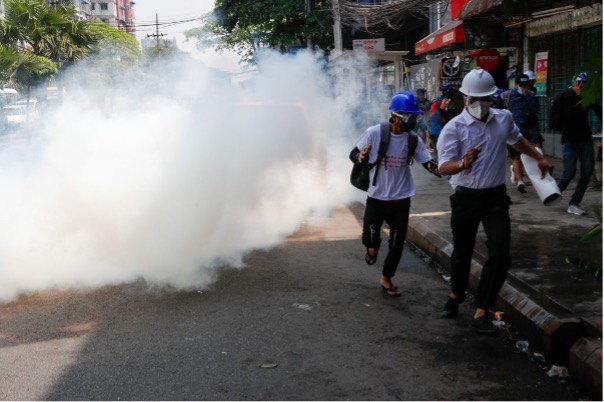Table of Contents
27th February 2021
Arrests and the detention of journalists continue as the military try to shut down the information flow. Yesterday saw the detention of a Japanese journalist and his subsequent release 6 hours later. Informal media reporting is being shut down and news is becoming hard to obtain.
There are still formal media reports coming through and stories from “The Global New Light of Myanmar” can be safely discounted as it is a Military owned newspaper. Reputable sources are the magazine “Frontier”, newspapers the Myanmar Times and the Irrawaddy and visual media Mizzima. Mizzima has just been banned from supplying content to the state-owned TV services and is still providing material from outside of Myanmar.
In view of this, today’s updates are from Frontier.
At 7:30 am on February 22, Daw Aye Myint queued outside a branch of the state-owned Myanma Economic Bank in Mawlamyine, the Mon State capital. A retired senior assistant teacher, she was on a mission to collect her government pension.
The 72-year-old, who retired in 2008, usually collects her pension at the end of the month, but an announcement on the 8 pm news on February 21 said pensions could be drawn the following day. The next morning, she left for the bank as early as she could.
When she arrived, Aye Myint was surprised by the size of the crowd waiting to get in. Nearly everyone there was a pensioner reacting to the same announcement she’d heard on TV the previous evening.
After the Tatmadaw seized power on February 1, public servants opposed to the coup have gone on strike as part of a Civil Disobedience Movement that has attracted broad support throughout the nation. These include employees of the four state-owned banks – the Myanma Foreign Trade Bank, Myanma Investment and Commerical Bank, Myanma Agriculture and Development Bank and MEB – leading all four to announce temporary service limits. As the CDM moves to private businesses in sectors seen as strategic for the junta, private banks have also suspended services, prompting branches in major urban areas to close and ATMs to run out of money.
A run on withdrawals at the military-owned Myawaddy Bank forced it twice to impose restrictions: on February 16 it limited services at branches to no more than 200 customers a day, with a K5-million maximum placed on withdrawals, and on February 18 it further restricted branch services to 100 customers a day and withdrawals to K1-million. Then, on February 23, it suspended withdrawals altogether until the end of the month.(approx. 1,000 MMK Kyat to the NZ$).
Still, despite her cautiously early arrival, her queue token was already No. 102, which gave her some doubt.
“I’m worried there won’t be any money left when I get served,” she said.
The bank opened at 9am. After patiently queueing for more than eight hours, Aye Myint was finally served at about 4pm – an hour later than the bank normally closes. It had to extend its hours to serve all those who had shown up.
Aye Myint filled out a withdrawal slip for four months’ pension, but the teller told her she could withdraw only two months’ worth. The rest, she was told, couldn’t be withdrawn until the end of the month. Most pensioners have accumulated several months’ worth of payments but the bank does not keep this entire amount on hand, so pensioners can only take out a portion at a time, she was told. She told Frontier that, as the queue eked along, she asked a security guard what was taking so long. He told her that, because so many employees had joined the CDM, the bank was short-staffed. In fact, he said, three or four of the tellers working that day had also initially joined the movement, but senior bank officers pressured them to return to process pensioner withdrawals. Khin Thida said the guard she spoke to also told her that cash reserves at the Yangon branch were “nearly exhausted”, and when she finally received her pension, at around 4:30 pm, she overheard tellers saying the reserves would only last another three or four days.
“I worry about whether older pensioners will be able to receive their payments,” she said. “At the moment, it’s not certain that I’ll receive mine next month.”
Mobile money services seem to also have taken a hit due to a growing shortage of cash in the economy. U Khin Maung Soe, a retired primary school principal from Yangon’s Pabedan Township, said retired friends of his have tried to use the Wave Money app to receive their pensions, but that “it does not work”.
“The problem is that no Wave Money agent will issue hundreds of thousands of kyats these days. They say they have no money,” he said. “People’s pensions are in the Wave Money app, but they can’t withdraw it in cash!”
Source The Frontier February 26th
If the Military bank is having trouble supplying cash then the CDM actions really are beginning to bite. In a race against time, the Military are trying to arrest ring leaders and ordinary members of CDM before the economy collapses.
Police have staged violent and unprovoked crackdowns on peaceful demonstrations across the country, firing tear gas and stun grenades to disperse protesters in Yangon, Monywa, Mandalay and other towns and cities.
In Monywa, the capital of Sagaing Region, a woman is reportedly in intensive care after being shot by security forces, while hundreds of people are thought to have been detained nationally, including at least five journalists.
A crowd has gathered outside Insein Prison in Yangon tonight waiting for news of relatives and friends who have been arrested. Local media reported that more than 100 people were arrested in Yangon alone, and around 10 prison trucks loaded with arrested protesters were seen entering the prison.
(Insein prison is notorious for inhuman conditions and is the first choice for incarcerating political prisoners)
In Yangon, the heaviest violence occurred on Bagayar Road in Sanchaung Township, where members of the General Strike Committee of Nationalities began protesting in the morning together with residents, erecting temporary barricades to try and protect themselves from police.
As armed riot police charged along the road, firing tear gas into side streets, terrified protesters and bystanders ran into apartment buildings. Frontier also observed police firing rubber bullets directly at people attempting to flee from buildings.

At least three Frontier staff covering the protests were hit with tear gas and spent much of the afternoon sheltering inside apartments in Sanchaung with residents and protesters, as police waited outside. Officers were also spotted confiscating goods from street vendors and taking food from shops.
After leaving Bagayar Road, protesters soon regrouped further to the west on Baho Road. Police advanced again, firing more tear gas, including into homes along Baho Road.
Photos from other media outlets show a police officer grabbing a pregnant woman by the throat, and another pointing a gun directly at a medical worker sitting barely a metre away.
Police appear to have made dozens of arrests in Sanchaung alone, with a Frontier reporter observing at least 21 people being put into a prison van, including a journalist from Myanmar Now. Also among those arrested were two bus drivers who apparently stopped their vehicles in the middle of the road to prevent police from reaching protesters.
Police also dispersed protesters in Hledan, arresting photojournalists from the Myanmar Press Agency and the Associated Press.
In downtown Yangon, there were similar scenes as police threw stun grenades and fired rubber bullets to disperse a small number of protesters. One officer threw a stun grenade directly at a Frontier journalist, but it failed to detonate. Police arrested at least three people, and brandished batons at a Frontier journalist who tried to take a photo. The police violence seemed entirely disproportionate given the relatively small scale of the demonstrations and their peaceful nature.
Videos from Monywa showed plainclothes people beating protesters with metal poles and dragging them violently into police vans. Another video shows a woman being hit in the face by a man in plain clothes while she is being held by three police officers.
Among those arrested was Monywa Gazette CEO U Kyaw Kyaw Win. Videos show him being arrested by three people in plainclothes and being violently forced into a prison van.
“While he was broadcasting live this morning, he was caught by plainclothes men and taken to a truck. It is not yet known where he has been taken,” colleague Ko Naing Soe told Frontier.
Hundreds of protesters are thought to have been arrested in Monywa and some people are still trapped inside Zaung Kyin Pin Monastery.
Meanwhile, a journalist from the Hakha Times confirmed that its CEO, Pu Lalawmpuia, was arrested around 3 pm. A livestream of his arrest shows him repeatedly telling police he is a journalist and showing his press card, but they detain him anyway.
There are reports of violence against monks and arrests of monks being made. That is really asking for trouble.
I apologise for the long piece today, but I feel it is important to understand the restrictions on reporting, the crashing economy and the bravery being exhibited by journalists on the ground in Myanmar. Without them we would only have rumour and state sponsored news. Perhaps the Military should stop using violence against journalists and bung them NZ$50,000,000.
Please share this article so that others can discover The BFD









